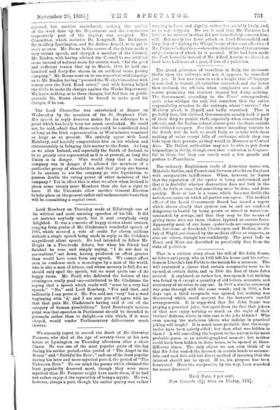The ordinary Englishman reads of Armenian massacres, 3fatabele battles, and
French and German attacks on England with comparative indifference. When, however, he learns that the reputation of the oyster is being undermined, and that it is doubtful whether destruction does not lurk in the shell, he feels at once that something must be done, and done quickly. Here at last is a cause which does not divide the nation,—a cause on which all parties can agree. The medical officer of the Local Government Board has issued a report which shows clearly that oysters can be and are rendered dangerous to health by being grown or stored in water con- taminated by sewage, and that they may be the means of giving those who eat them cholera, typhoid or enteric fever. Apparently most of our home oyster-beds are comparatively safe, but those at Southend, Cleethorpes, and Medina, in the Isle of Wight, are classed by the medical officer as suspects, as also are others, though, less confidently. The great beds in Essex and Kent are described as practically free from the risks of pollution.










































 Previous page
Previous page